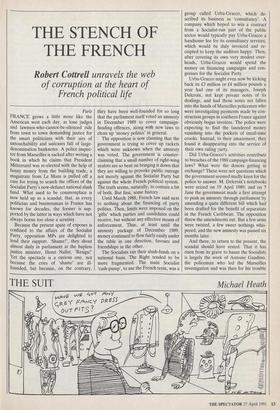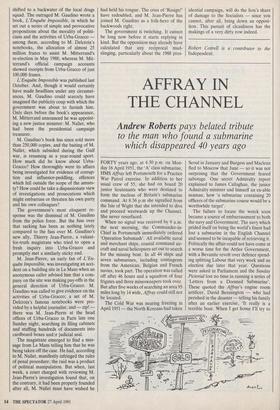THE STENCH OF THE FRENCH
Robert Cottrell unravels the web
of corruption at the heart of French political life
Paris FRANCE grows a little more like the American west each day, as lone judges and lawmen-who-cannot-be-silenced ride from town to town demanding justice for the smart politicians with their airs of untouchability and suitcases full of large- denomination banknotes. A police inspec- tor from Marseilles is sacked after writing a book in which he claims that President Mitterrand was re-elected with the help of funny money from the building trade; a magistrate from Le Mans is pulled off a case for trying to search the offices of the Socialist Party's now-defunct national slush fund. What used to be commonplace is now held up as a scandal: that, as every politician and businessman in France has known for decades, the former is sup- ported by the latter in ways which have not always borne too close a scrutiny.
Because the present spate of exposes is confined to the affairs of the Socialist Party, opposition MPs are delighted to lend their support. 'Shame, they shout almost daily in parliament at the hapless Justice minister, Henri Nallet. 'Resign!' Yet the spectacle is a curious one, not because the cries of 'shame' are ill- founded, but because, on the contrary, they have been well-founded for so long that the parliament itself voted an amnesty in December 1989 to cover campaign- funding offences, along with new laws to clean up 'money politics' in general.
The opposition is now claiming that the government is trying to cover up rackets which were unknown when the amnesty was voted. The government is counter- claiming that a small number of right-wing zealots are so bent on bringing it down that they are willing to provoke public outrage not merely against the Socialist Party but against the whole French political system. The truth seems, naturally, to contain a bit of both. But first, some history.
Until March 1988, French law said next to nothing about the financing of party politics. Then, limits were imposed on the `gifts' which parties and candidates could receive, but without any effective means of enforcement. Thus, at least until the amnesty package of December 1989, money continued to flow fairly easily under the table in one direction, favours and friendships in the other.
The Socialists ran their slush-funds on a national basis. The Right tended to be more fragmented. The main Socialist `cash-pump', to use the French term, was a group called Urba-Gracco, which de- scribed its business as 'consultancy'. A company which hoped to win a contract from a Socialist-run part of the public sector would typically pay Urba-Gracco a handsome fee for its consultancy services, which would be duly invoiced and re- ceipted to keep the auditors happy. Then, after covering its own very modest over- heads, Urba-Gracco would spend the money on financing campaigns and con- gresses for the Socialist Party.
Urba-Gracco might even now be kicking back its £3 million or £4 million pounds a year had one of its managers, Joseph Delcroix, not kept private notes of its dealings, and had those notes not fallen into the hands of Marseilles policemen who were investigating payments made by con- struction groups in southern France against obviously bogus invoices. The police were expecting to find the laundered money vanishing into the pockets of small-time crooks. Instead, to their amazement, they found it disappearing into the service of their own ruling party.
Did Urba-Gracco's activities contribute to breaches of the 1988 campaign-financing laws? What were the donors getting in exchange? These were not questions which the government seemed madly keen for the police to answer. M. Delcroix's notebooks were seized on 19 April 1989; and on 5 June the government made a first attempt to push an amnesty through parliament by amending a quite different bill which had been drafted for the benefit of separatists in the French Caribbean. The opposition threw the amendments out. But a few arms were twisted, a few sweet nothings whis- pered, and the new amnesty was passed six months later.
And there, to return to the present, the scandal should have rested. That it has risen from its grave to haunt the Socialists is largely the work of Antoine Gaudino, the policeman who led the Marseilles investigation and was then for his trouble shifted to a backwater of the local drugs squad. The outraged M. Gaudino wrote a book, L'Enquete Impossible, in which he set out a series of simple and provocative propositions about the morality of politi- cians and the activities of Urba-Gracco among them, according to M. Delcroix's notebooks, the allocation of almost 25 million francs to assist M. Mitterrand's re-election in May 1988; whereas M. Mit- terrand's official campaign accounts showed receipts from Urba-Gracco of just 100,000 francs.
L'Enquete Impossible was published last October. And, though it would certainly have made headlines under any circumst- ances, M. Gaudino could scarcely have imagined the publicity coup with which the government was about to furnish him. Only days before the book's appearance, M. Mitterrand announced he was appoint- ing a new justice minister: M. Nallet, who had been the presidential campaign treasurer.
M. Gaudino's book has since sold more than 250,000 copies, and the baiting of M. Nallet, which subsided during the Gulf war, is resuming as a year-round sport. How much did he know about Urba- Gracco? How thoroughly were its affairs being investigated for evidence of corrup- tion and influence-peddling, offences which fell outside the scope of the amnes- ty? How could he take a dispassionate view of investigations and prosecutions which might embarrass or threaten his own party and his own colleagues?
The government's most eloquent re- sponse was the dismissal of M. Gaudino from the police force. But the fuss over that sacking has been as nothing lately compared to the fuss over M. Gaudino's new ally, Thierry Jean-Pierre, a valiant- for-truth magistrate who tried to open a fresh inquiry into Urba-Gracco and promptly met a similarly sticky end.
M. Jean-Pierre, an early fan of L'En- quete Impossible, was investigating an acci- dent on a building site in Le Mans when an anonymous caller advised him that a com- pany on the site was making pay-offs in the general direction of Urba-Gracco. M. Gaudino was called to give evidence on the activities of Urba-Gracco; a set of M. Delcroix's famous notebooks were pro- vided by a helpful journalist; and — zip! there was M. Jean-Pierre at the head offices of Urba-Gracco in Paris late one Sunday night, searching its filing cabinets and stuffing hundreds of documents into cardboard boxes und2,r judicial seal.
The magistrate emerged to find a mes- sage from Le Mans telling him that he was being taken off the case. He had, according to M. Nallet, manifestly infringed the rules of penal procedure; the raid was a product of political manipulation. But when, last week, a court charged with reviewing M. Jean-Pierre's investigation found that, on the contrary, it had been properly founded after all, M. Nallet must have wished he had held his tongue. The cries of 'Resign!' have redoubled, and M. Jean-Pierre has joined M. Gaudino as a folk-hero of the backwoods right.
The government is twitching. It cannot be long now before it starts replying in kind. But the opposition may already have calculated that any reciprocal mud- slinging, particularly about the 1988 pres- idential campaign, will do the lion's share of damage to the Socialists — since you cannot, after all, bring down an opposi- tion. This pursuit of cleanliness has the makings of a very dirty row indeed.
Robert Cottrell is a contributor to the Independent.



















































 Previous page
Previous page